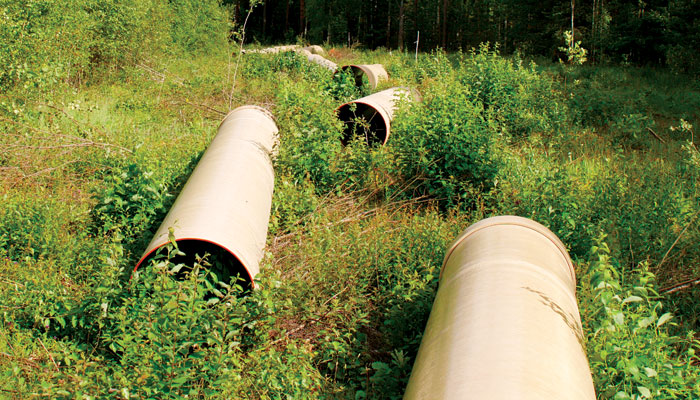All
Natural Gas Expansion Hits Obstacles

Projects continue despite drilling mishaps, cost overruns
Natural gas pipeline companies and utilities are pressing ahead with their efforts to expand natural gas supply in New England while also hitting some bumps in road.
In Connecticut, where Gov. Dannel P. Malloy is promoting a plan to add 900 miles of new gas pipelines and convert 280,000 homes from Oilheat to gas heat, expansion is proving difficult, according to Christian Herb, President of the Connecticut Energy Marketers Association (CEMA). A pipeline expansion plan in West Haven has stalled because the utility has been unable to secure enough customer pledges to convert. Pipeline expansion in the town of Manchester has also stalled, according to Herb.
The state’s Public Utilities Regulatory Authority (PURA) has required utilities to enroll at least 60 percent of potential new customers on any proposed line in order to charge construction costs to the ratepayer base. That target has proved difficult to achieve, and the utilities are now going back to PURA to request an easier threshold, the CEMA President said. “They are asking for additional help to allow them to move forward, even though they are not meeting the original standards,” he said, noting that the negotiations are taking place behind closed doors. The utilities are also seeking permission to pass on to ratepayers any cost overruns up to approximately 50 percent of project cost. The original agreement allowed the billing of cost overruns up to 30 percent.
CEMA has also sued the Connecticut Department of Energy and Environmental Protection (DEEP) and PURA, alleging that the agencies violated state environmental laws in an effort to fast-track the natural gas expansion plan. Herb said that any expansions of heating oil facilities would be subject to environmental review, and the utilities should be held to the same standard. “We ask that companies be treated equally under the law with no special favoritism,” he said.
Drilling Mishaps in Maine
Meanwhile in Maine, Summit Natural Gas faces fines of up to $300,000 after damaging sewer lines in at least 25 places during horizontal drilling installations in Augusta, Gardiner, Yarmouth and Cumberland. The state’s Public Utilities Commission (PUC) issued the penalty recommendations and asked that Summit dig up some pipelines that it has installed in proximity to existing utility lines.
A gas safety manager for the PUC said the most severe incident of reckless drilling occurred in Gardiner, where Summit drilled a natural gas pipeline through a sewer line. A homeowner detected something wrong and called a plumber, who inadvertently chipped away at half of the thickness of the inactive natural gas pipeline while trying to clear the blockage with a mechanical snake. “Had the gas main been active and there had been more aggressive attempts to clear the sewer lateral, the results may have been disastrous,” the inspector’s report states.
In an unrelated development, the staff of the Maine PUC recently cast some doubt on the state’s plan to subsidize new gas pipelines on the back of ratepayers. The staff cautioned that it is unlikely that the benefits to Maine consumers would exceed the costs of pipeline capacity. Members of the Commission will ultimately decide whether to approve ratepayer funding to subsidize the costs of pipeline expansion.
Jamie Py, President of the Maine Energy Marketers Association (MEMA), declined to predict how the Commission would decide but said the state is sensitive to the risk of using state money to underwrite energy projects. “The state has done the same thing before with electricity, and we’ve been paying billions ever since,” he said.
The recent drop in oil prices serves as a reminder of the risks of making long-term investments on the basis of current commodity prices, according to Py. “Who would have predicted that oil would now be at $80 a barrel?” he asked.
Vermont Board Oks Price Increases
In Vermont, the Public Service Board recently declined to revisit its approval of a gas pipeline connected Colchester to Middlebury despite news that the project cost was increasing by 40 percent. Construction of the 41-mile pipeline is poised to commence pending the granting of easements by property owners along the pipeline route. Vermont Gas recently announced that it had secured easements from 75 percent of landowners.
“The pipeline is coming and it will provide consumers with another choice, but to assume that customers will choose natural gas is a big assumption,” said Matt Cota, Executive Director of the Vermont Fuel Dealers Association. “We think in the long term consumers in Addison County will see the benefits of Oilheat when they are presented with a choice of spending $8,000 to $12,000 to convert or to stay with heating oil that is clean and renewable at a more affordable price.”
There were other recent developments as well:
- Spectra Energy announced it is partnering with Northeast Utilities on the Access Northeast expansion project, which would expand Spectra’s existing pipeline infrastructure that includes the 1,130-mile Algonquin Gas Transmission and the 890-mile Maritimes and Northeast Pipeline. The project would expand delivery capacity by as much as 1 billion cubic feet per day.
- Kinder Morgan Energy Partners LP announced it is beginning the application process with the Federal Energy Regulatory Commission (FERC) for its proposed Northeast Energy Direct pipeline, which would deliver natural gas produced in Pennsylvania to Massachusetts. The project would includes 125 miles of new “greenfield” pipeline stretching from the New York-Massachusetts border to Dracut, Mass., near the New Hampshire border. Northeast Energy Direct would deliver up to 2.2 billion cubic feet a day of natural gas.
Related Posts
 The Possibilities of Renewable Propane
The Possibilities of Renewable Propane
Posted on March 13, 2024
 Propane Can Do That
Propane Can Do That
Posted on March 12, 2024
 Take Action and Take Control of Your Future at Industry Summit VI and Visions ‘24
Take Action and Take Control of Your Future at Industry Summit VI and Visions ‘24
Posted on March 11, 2024
Enter your email to receive important news and article updates.

